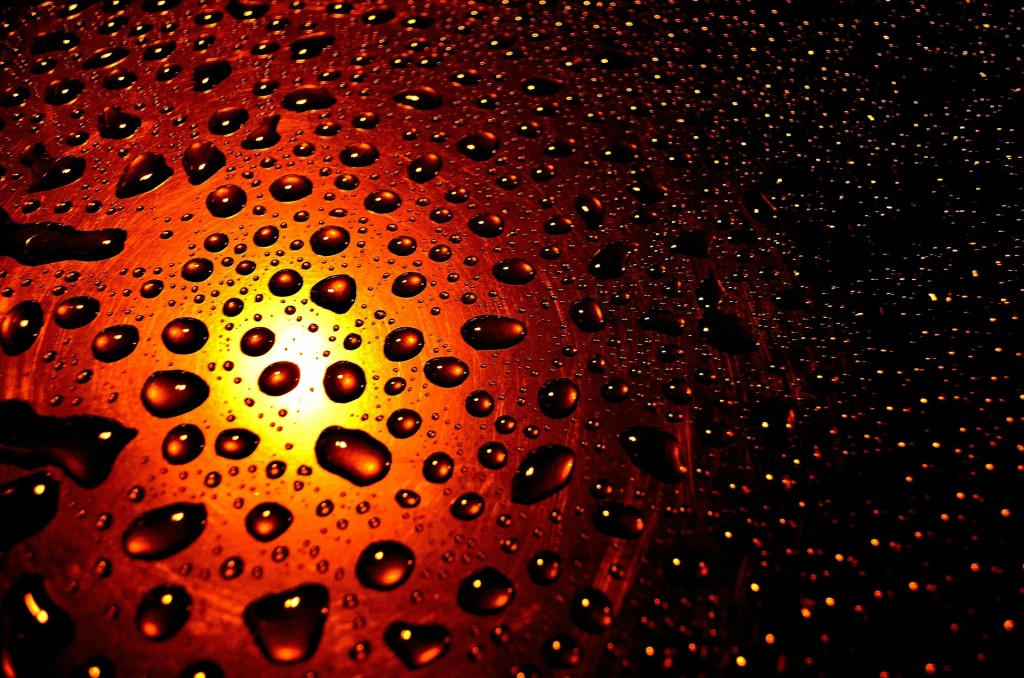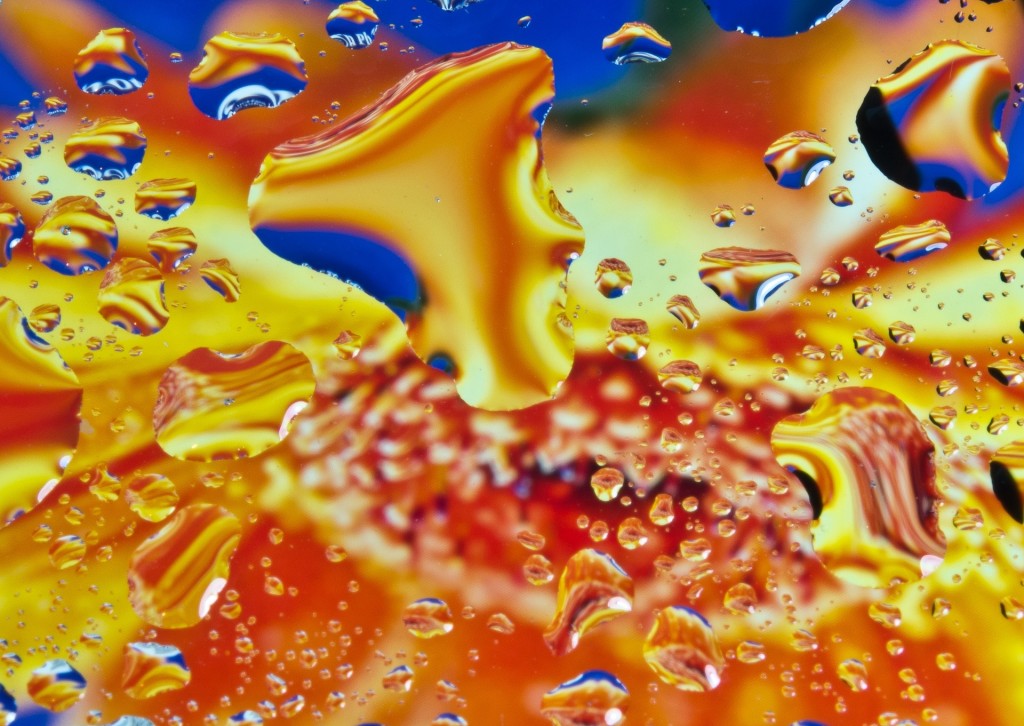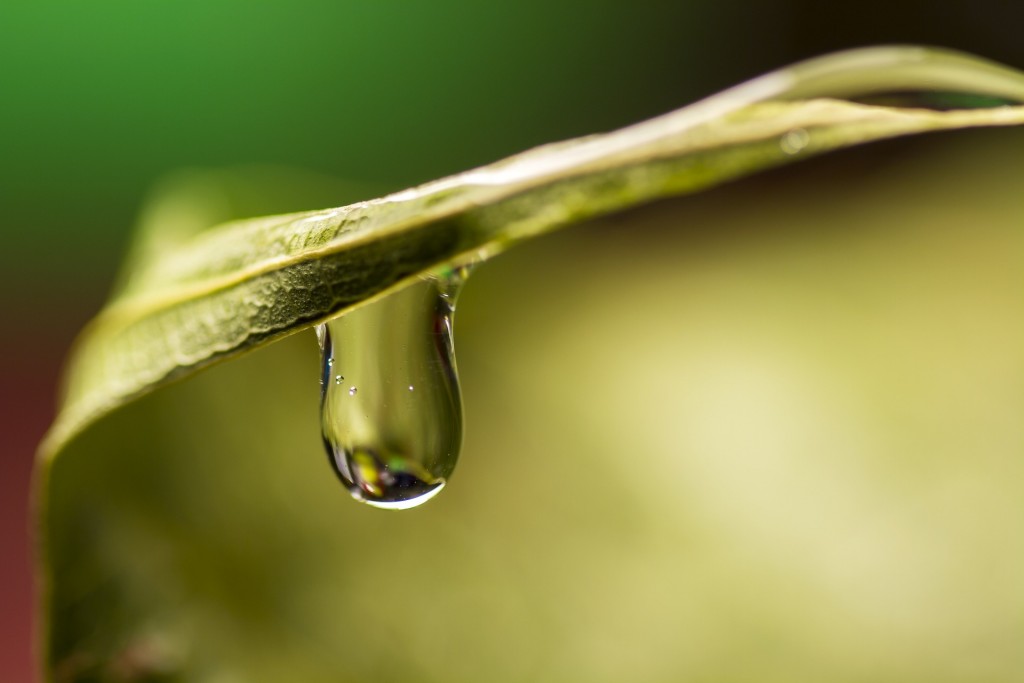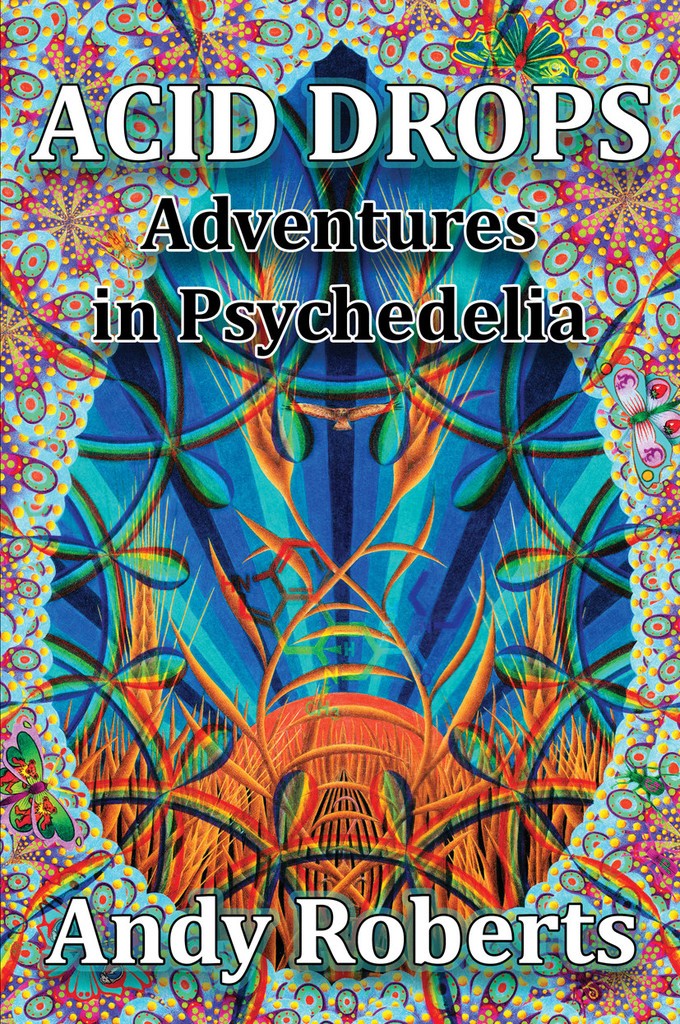The following is an exclusive extended foreword by Ben Sessa from the newly published Acid Drops: Adventures in Psychedelia by Andy Roberts.
Let us, for a moment, consider those three little letters: L, S and D. Or perhaps, if we dare, three more, say, D, M and T. Or even the peculiar, simultaneously scientific and druid-sounding word, psilocybin.
Until a few years ago these words were primarily something to do with the 1960s; an archaic throwback to a distant cultural revolution of which your father – or even your grandfather – used to be part. But that is no longer the case. LSD, DMT, psilocybin – and their new cousins MDMA, 2C-B, 5-MeO-DMT and the rest – are suddenly very now. Psychedelics are the new cool. A lot of swirling, coloured water has passed under the Bridge of Sighs since the Small Faces and their pals turned on the world of our elderly relations. Psychedelic culture exploded, burned, died down and then, from the general public’s point of view, appeared to go almost entirely cold. Unless you were lucky enough to be one of the few in-the-know people hanging around Esalen, or were prepared to live a maligned life on the edge of society in a Peace Convoy bus in Wiltshire, then since the early Seventies psychedelics were really not part of many people’s lives. Good, as far as I am concerned. After the Sixties a hiatus is exactly what was needed. The gap in societal interest in psychedelics has subsequently left space for a whole new way of looking at these wonderful chemicals; an opportunity for unbiased scholars and explorers to reflect without the vacuous distractions of contemporary fashion. The result, however, is that many of today’s kids reaching out for understanding of the cultural and historical significance of the psychedelic experience are drug-geek, mouse-clicking introverts; hungry for relevant and digestible knowledge of their forefathers’ exploits whilst concurrently trying to maintain some degree of coolness with their Facebooking peers. And who better to indulge their green gills with thought-provoking psychedelic bewilderments that Mr. Andy Roberts: Contemporary society’s premier Thinking-Man’s Hippie.
Whilst thoroughly modern, psychedelic culture is also ancient and distant; and because it was always been so, in the 1960s psychedelia drew heavily on the primordial scripts of the pagan and Eastern religions for its inspiration. But for the average Wi-Fi-kid these days the 1960s, which are so last century, man, may as well be prehistoric. Which means today’s psychedelic culture has a history of it’s own that needs to be understood and assimilated just as much as the shamans of old. Psychedelia is embedded in myth and magic. It simply wouldn’t work without the dogmatic drawl of armchair hippie do-gooders misquoting at dawn, not knowing their Abbie Hoffmans from their Albert Hofmanns. This subject, therefore, is in dire need of some journalistic accuracy. But no one would be interested in such a read if it wasn’t also shot through with otherworldly magic. Enter Andy Roberts’ Acid Drops. So if you are reading this foreword because you are looking for a book that will give you a simple up-to-date re-hashish of the same old psychedelic stories and myths then you might like to consider putting this down (and picking up the more vacuous Psychedelic Renaissance instead, perhaps). Because Acid Drops is so much more.
Sure, within the pages of Roberts’ book you will find plenty of well-sourced data on all the typical psychedelic stories of old – and all the usual characters and heroes are here: from Leary to Laing to Hollingshead, Ginsberg, Grof and Jung. But under Roberts’ beady, newspaper-reportage eye no mere myth is submissively accepted without his distinctive examination. Roberts is the man in the background, the fly agaric on the wall, breaking bread with the hippies of old but always prepared to see things his own way; asking with his quizzical frown, “Really? Was it really like that?” The classic stories and legends are picked apart, quite rightly, and dogmatic psychedelic beliefs are left tantalisingly dangling – a wonderful literary device that allows Roberts – and therefore the reader – to form their own opinions. If, by this process, heroes find themselves vilified or villains rise to the fore as shining beacons of bohemian lava light then so be it. It is only through such a practice that we can get anywhere near the truth; if such a thing is even possible in the cauldron of psychedelic history.
In highlighting this stubbornness for detail it is clear from his writing that Andy Roberts is no dippy hippy. However, quite obviously, nor is he a straight-sided square with a total distrust for pixies. Far from it; the man is an anti-authoritarian, free-thinking staunchly alternative individual who has happily nailed his colours to the mast of weirdness. But is it really possible to align oneself with the freaks without being lost in their sea of ethereal fluffiness? Yes, it is. Here is a man who, when he mentions the pineal gland, does so in reference to what it actually is. Because despite what you hear on the endless podcasts of today’s Ayahuasca-baked psychedelic communities, the pineal gland is not a supra-dimensional portal to a world of entities modulated by DMT. It is, in fact, a relatively insignificant but interesting little part of the brain that modulates wakefulness in response to light via the hormone melatonin. And with that keen eye on the difference between myths and science, Mr. Andy Roberts, to me at least with my need for neurophysiological accuracy, commands enormous respect. He is bang on the button and his methods are scrupulous. His knowledge draws authoritatively on modern and ancient literature research, which he augments with illuminating self-hand accounts from formal interviews, fireside talk and, perhaps also, from those ethereal voices of passing entities. This is second to none journalism.
It is these qualities of Roberts’ that have made him a firm favourite at the UK Breaking Convention conference since it’s inception in 2010. His organisational skills and gently sensitive but no-nonsense approach is exactly what is needed when it comes to shepherding 800 psychedelic cats from one visio-aural delight to another. The gig would not happen without him. Breaking Convention is our UK attempt to blend the ancient with the contemporary and who better at the helm, therefore, than Andy Roberts. In this book we see him dragging his willing interviewees back to older, and perhaps better, times. By giving the people who were there a platform on which to wax lyrical he brings in the younger generation to judge for themselves what to use and what to revitalise. There is never any hint of derision or patronisation from Roberts as he hones the interviews in Acid Drops to carefully craft his process of analysis. He clearly loves all the generations of psychedelia and favours none – though there is no hiding his fondness for the tepees and, particularly, the music of old. But, as we have established, psychedelia is about the here and now, as he states when examining how and why LSD found itself becoming illegal in the UK in 1966. Despite a sparse evidence-base for any particular harms but rather fuelled by a sensationalist hungry media, LSD’s banning resonates cruelly with our own current Psychoactive Substances Act of 2016. Prepare yourself for whatever grisly, culturally strangulating and harmful ramifications may come to us all as a result of such nanny state interferences of developmental growth. I have no doubt Roberts will let us know his thoughts and feeling on this subject in due course.
The Jeff Dexter interview is a trip historian’s dream, a conduit to those times; dropping all the right names whilst dropping all the right acid. And Roberts’ questions help to place us at Dexter’s sandy feet as we all sit on the beaches of Ibiza with Soft Machine or stand behind the turntables at the Roundhouse amongst the freaks and bands of the time. We also hear from another contemporary, Liz Elliot, who speaks so candidly about her experiences in psychedelic London and on the run with Leary. Spurred on by Roberts’ curious regard and gentle manner, again, one lounges beside her in Algiers and Switzerland, surrounded by suitcases of acid, guns, CIA henchmen and hash oil motorbikes. Who wouldn’t have wanted to be part of such things? Roberts conveys tangibly how much he would have liked to be there, and it is his neck-craning curiosity and respect for these times that keeps the reader in the Kasbah throughout.
Trip Lit, Psychedelic Fiction, call it what you will, is – thankfully – rather sparse, because if everyone was doing it can you imagine the sort of trip-report dross we would all have to endure? Roberts’ showcases the best, in his interview with Ramsey Campbell on fear, horror and beauty in equal measures amidst LSD dreamscapes. But it is Roberts’ own pieces of eerie fiction and stream of consciousness poetry that stand out. With steely prose he throws open his personal psychedelic experiences, dragging us into his fantasies and fears. And why not? His delusional, drug-addled creatures are as valid as anyone else’s. Throughout Acid Drops he reveals his vulnerability in the eye of the storm as much as the next Elvin explorer. I can see him now; a bare-footed 1970s hippie, traipsing the corridors of psychic madness looking for his jumper or his other shoe, babbling incoherent profundities into the pungent incense air beneath peeling rock posters as he attempts – better than most – to describe in tangible detail just what the fuck is going on, for us to voyeuristically mop up and appreciate in the misty morning gardens all wet with rain. Sentences like this, from Misty Mountain Drop, say it all:
“Dan tried to get a grip as waves of recently metabolised psilocybin swept through him. He wasn’t sure now how long this had lasted and tried desperately to think himself out of it. Instead he found he was just staring intently at a lichen covered rock, its vivid yellow crotal (sic) skin writhing and pulsing, undulating as faces and patterns formed and dissolved, coloured pinheads of light exploding outwards.”
So who needs Haight-Ashbury when floating in front of one’s befuddled mindscape is a panoramic view of the Huddersfield ICI factory? Roberts carries us on his back to these places, on walks on Welsh beaches searching his mind for plastic ducks on which to hang his coincidences and with acid brother Graeme Hartley “On into the dreamery (sic), the shape-shifting scenery”, throwing up sculptures from forests from that shaman David Kemp. Graeme sounds cool. And such a close friend of Andy’s will, I hope, in time, become mine too.
Any time spent in conversation with Roberts will inevitably turn to music. I was thrilled to find that we share at least four of our top ten best albums of all time. I had always thought my favourite music was fairly obscure, but this makes me realise I am either not such a nutter after all – or perhaps I am. I couldn’t care less which. Roberts’ love of music – and the strange psychedelic type in particular – is the closest he gets to being a dealer. He sells you, the reader, the Incredible String Band, he positively pushes the stuff. It is not possible to read the Acid Drops review of The Hangman’s Beautiful Daughter without going out (or staying in with one’s computer, as things are these days) and buying the album. He is to Man at ISB what ISB is to Man at LSD. This magical band, who once lived allegedly in a hedgerow at Thrupp, come alive in Roberts’ words. Who wouldn’t want to be them? This is the sort of music that makes you yearn to be damp in Scotland or drenched in Wales. And if you were ever to find yourself in such a position be sure to drop in on the Roberts’ for tea – of sorts.
It is an uphill path we are treading for those us in contemporary psychedelia. A constant striving to keep our minds open in this quagmire of Californian pseudoscience – but, to quote Walter Koschnig, not so open that our brains fall out. Everywhere are inflexible soothsayers, whose dogged beliefs in the shifting patterns of psychedelic visions are sworn with a voraciousness greater than your average fundamentalist Catholic or Muslim. Sometimes it is hard to move through their protoplasmic slime without falling over their obligatory illusory entities. Yet Roberts, with his dry humour and eye for detail, can see for miles and miles where others are still struggling several bardos behind. This is a man who, if he believed in them, would certainly keep his chakras clean and third eye well watered. For his subjects – UFOs, ESP, Tarot – are tricky ones to present. So easy is it to fall into the trap of being either overly ironic or sycophantically delusional. But he bravely carries us to these places nevertheless, dropping us safely back down to ground in the wholesome goodness of Welsh mushroom gatherings; where police dig trenches for wilful hippies to back-fill and where kettles of bubbling goodness light the skies above Devil’s Bridge with fungal colour.
But Acid Drops, for all it’s professionalism, is not merely an unbiased commentary. Roberts is a believer. Not necessarily in the popular armchair mythologies themselves – he’s no mug – but he is a passionate devotee and chronicler of the people behind the stories; a visionaries’ visionary; the man on the side lines with the microphone giving us a grandstand view of the freaks as they drift by. With deep respect for the participants of the subject he tells it like it is, or might be, or even isn’t. I think, in fact, Andy Roberts would make a great psychiatrist. He has mastered the knack of nodding and smiling, respecting the colourful dreams of his psychotic clients without either disagreeing, disbelieving or disrespecting the incoherent warbling of their dreams, but rather being alongside them, holding their hand as their trip progresses and in doing so drawing more colour into all of our lives. Because it is from the dreamers, the subjectivity of the psychedelic experience on naïve minds, that ideas are born and Roberts – like everyone else in this field – is clever enough to recognise that. If we can’t see past the end of our stethoscopes because of our purely materialistic approach to culture, we are missing a trick – not to mention the best parties.
And you can bet your (after) life that if there was a late night drug session with Aleister Crowley at the alter, with Jeff Dexter on the decks and Joe Boyd choosing the records, whilst Leary reclines on the rug and the String Band drink tea at the table with Led Zeppelin as Ginsberg and Osmond stand in the kitchen swapping hash cake recipes, Andy Roberts will be there somewhere; showing everyone his endless photographs of wild birds, reminding us to stop taking ourselves quite so seriously and hurriedly writing it all down in a language we will remember after the event. This is not to say that all the subjects and interviewees of Acid Drops are as mad as white rabbits. One just has to have enough nouse to know on what side one’s cerebral cortex is buttered. But that doesn’t stop Roberts dipping his sulci and gyri into the pot of psychedelic jam and coming up roses every time.
So, to conclude, back to those three little letters, L, S and D, and all the Storming Heaven they have created. It’s a minefield out there if one aligns oneself with such crazy horses. Which is why, personally, I owe so much to Andy Roberts. When I first published on psychedelics in the doubting and dubious UK medical press he was the first person to critically appraise my work in print. He quickly became an inspiration to me to continue my research of psychedelic drugs. But then, Roberts has a habit of doing this to people. He helps them form their own opinions, respectively put aside the negative bias that surrounds this subject and encourages one to crystallise one’s thoughts on psychedelics into a narrative worth fighting for. The words Andy choses to highlight his heroes helps the reader to ask for themselves whether there really is a magical universe worth believing in; rather than simply telling them there is. And in doing so, his influence on me personally has kept me looking at the skies – whether to see some real magic or simply prove to myself there is nothing to see, I cannot tell. But one way or the other, I just have to keep looking. And this book is certainly a good place to start.
This is an extended Foreword by Ben Sessa from the book Acid Drops: Adventures in Psychedelia by Andy Roberts, published with permission from Psychedelic Press and released in the UK on 22nd May 2016.
Andy Roberts will be speaking about his new book alongside researcher David Luke tonight at an event hosted by The Psychedelic Society, titled How LSD Changed Britain. Tickets and details here.
Dr Ben Sessa is a consultant adolescent and adult addictions psychiatrist, psychedelic researcher, co-founder of Breaking Convention conference and author of The Psychedelic Renaissance and To Fathom Hell and Soar Angelic.





